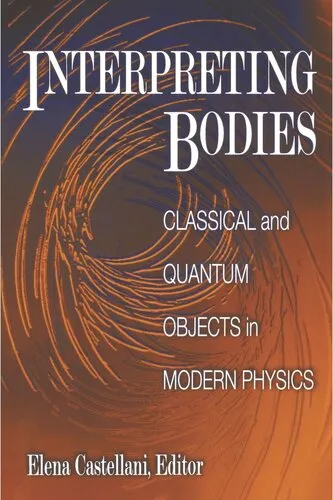Interpreting Bodies: Classical and Quantum Objects in Modern Physics
4.7
Reviews from our users

You Can Ask your questions from this book's AI after Login
Each download or ask from book AI costs 2 points. To earn more free points, please visit the Points Guide Page and complete some valuable actions.Introduction to 'Interpreting Bodies: Classical and Quantum Objects in Modern Physics'
Physics has long been a cornerstone of our understanding of the universe, shaping everything from the smallest particles to the most vast cosmic systems. In 'Interpreting Bodies: Classical and Quantum Objects in Modern Physics', edited by Elena Castellani, readers are invited to explore one of the most pressing philosophical challenges in modern physics: the nature and interpretation of physical objects. Through a collection of essays by leading philosophers of science and physicists, this book provides a deep examination of how the classical and quantum realms intersect, diverge, and inform each other in our quest to grasp the true nature of reality.
Detailed Summary of the Book
At its heart, 'Interpreting Bodies' delves into questions that sit at the boundary of physics and philosophy: What does it mean to be a physical object? How should we understand the profound differences between how "objects" are characterized in classical mechanics and quantum mechanics? The essays within this volume tackle such puzzles, offering a diversity of perspectives and analysis tools to bridge these domains.
The book is divided into thematic sections, each addressing key aspects of the physical and philosophical considerations. Topics range from the ontological status of particles and fields to the conceptual implications of quantum mechanics, such as nonlocality and entanglement. The contributors explore physical objects not merely as entities occupying space and time but also as constructs shaped by mathematical formalisms and experimental practices. It is this interplay of theory and observation that underscores the complexity of interpreting physical objects.
Another central theme of the book is how modern physics necessitates a reevaluation of classical notions of individuality and objectivity in science. With quantum mechanics’ peculiar phenomena, such as wave-particle duality and the superposition of states, the boundaries of physics blur into philosophy, raising critical questions about measurement, determinism, and the limits of human knowledge.
Key Takeaways
- Classical physics provides an intuitive framework for understanding physical objects, but it is challenged by the counterintuitive nature of quantum phenomena.
- Quantum mechanics introduces concepts such as entanglement and superposition, which challenge traditional interpretations of individuality and physical reality.
- The philosophical implications of physics are not secondary to its scientific advancements but are integral to how we define and understand the universe.
- Interconnecting the classical and quantum domains requires more than mathematics; it demands a multidisciplinary dialogue involving philosophy and epistemology.
Famous Quotes from the Book
"The history of physics is not merely a history of empirical discovery; it is also the history of conceptual tools created to make sense of what is observed."
"Modern physics challenges our deepest intuitions about the nature of objects, space, and time. We are forced to rethink the very language we use to describe the physical world."
Why This Book Matters
'Interpreting Bodies' is not just a collection of academic essays; it is a profound engagement with the philosophical foundations of modern scientific thought. In an era where physics continues to push the boundaries of knowledge with discoveries like quantum computing and gravitational waves, understanding the conceptual underpinnings of physical objects assumes critical importance.
This book matters because it ventures into the complex territory of rethinking reality. It provides not only a survey of the philosophical debates surrounding classical and quantum objects but also equips readers with the intellectual tools to engage with these debates on a meaningful level. For physicists, philosophers, and curious readers alike, this compendium serves as a bridge between the scientific and philosophical dimensions of modern physics.
Furthermore, it stands out in its ability to make sophisticated ideas accessible without diminishing their depth. The interdisciplinary insights it offers encourage scholars and thinkers to collaborate across domains, enriching our broader understanding of the universe.
Through its synthetic approach to classical and quantum frameworks, 'Interpreting Bodies' reminds us that the pursuit of science is, at its very core, a philosophical endeavor.
Free Direct Download
Get Free Access to Download this and other Thousands of Books (Join Now)
For read this book you need PDF Reader Software like Foxit Reader


